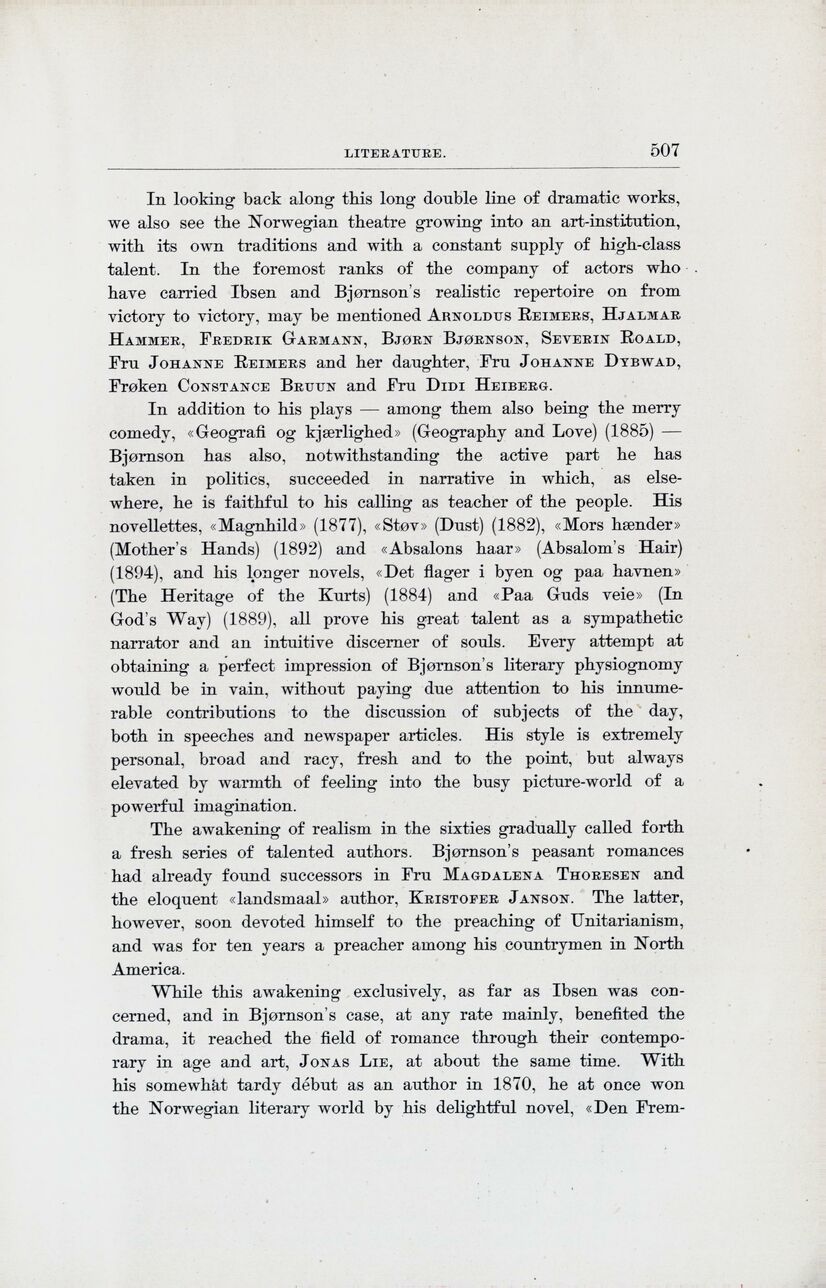
Full resolution (JPEG) - On this page / på denna sida - Literature, by Chr. Brinchmann

<< prev. page << föreg. sida << >> nästa sida >> next page >>
Below is the raw OCR text
from the above scanned image.
Do you see an error? Proofread the page now!
Här nedan syns maskintolkade texten från faksimilbilden ovan.
Ser du något fel? Korrekturläs sidan nu!
This page has been proofread at least once.
(diff)
(history)
Denna sida har korrekturlästs minst en gång.
(skillnad)
(historik)
In looking back along this long double line of dramatic works,
we also see the Norwegian theatre growing into an art-institution,
with its own traditions and with a constant supply of high-class
talent. In the foremost ranks of the company of actors who
have carried Ibsen and Bjørnson’s realistic repertoire on from
victory to victory, may be mentioned Arnoldus Reimers, Hjalmar
Hammer, Fredrik Garmann, Bjørn Bjørnson, Severin Roald,
Fru [[* sic]] Johanne Reimers and her daughter, Fru [[** sic]] Johanne Dybwad,
Frøken [[** sic]] Constance Bruun and Fru [[** sic]] Didi Heiberg.
In addition to his plays — among them also being the merry
comedy, «Geografi og kjærlighed» (Geography and Love) (1885) —
Bjørnson has also, notwithstanding the active part he has
taken in politics, succeeded in narrative in which, as
elsewhere. he is faithful to his calling as teacher of the people. His
novellettes, «Magnhild» (1877), «Støv» (Dust) (1882), «Mors hænder»
(Mother’s Hands) (1892) and «Absalons haar» (Absalom’s Hair)
(1894), and his longer novels, «Det flager i byen og paa havnen»
(The Heritage of the Kurts) (1884) and «Paa Guds veie» (In
God’s Way) (1889), all prove his great talent as a sympathetic
narrator and an intuitive discerner of souls. Every attempt at
obtaining a perfect impression of Bjørnson’s literary physiognomy
would be in vain, without paying due attention to his
innumerable contributions to the discussion of subjects of the day,
both in speeches and newspaper articles. His style is extremely
personal, broad and racy, fresh and to the point, but always
elevated by warmth of feeling into the busy picture-world of a
powerful imagination.
The awakening of realism in the sixties gradually called forth
a fresh series of talented authors. Bjørnson’s peasant romances
had already found successors in Fru [[** sic]] Magdalena Thoresen and
the eloquent «landsmaal» author, Kristofer Janson. The latter,
however, soon devoted himself to the preaching of Unitarianism,
and was for ten years a preacher among his countrymen in North
America.
While this awakening exclusively, as far as Ibsen was
concerned, and in Bjørnson’s case, at any rate mainly, benefited the
drama, it reached the field of romance through their
contemporary in age and art, Jonas Lie, at about the same time. With
his somewhat tardy début as an author in 1870, he at once won
the Norwegian literary world by his delightful novel, «Den
<< prev. page << föreg. sida << >> nästa sida >> next page >>